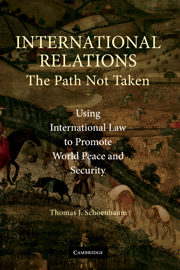Book contents
- Frontmatter
- Contents
- Preface and Overview
- 1 Introduction: Two Very Different Wars in Iraq
- 2 The Twenty-First Century – The End of History or a New Beginning?
- 3 International Power Politics
- 4 A New Global Order Based on International Law and Multilateralism
- 5 Peace and Security: Reinventing the United Nations
- 6 International Political Economy
- 7 International Environmental Protection
- 8 International Human Rights
- 9 International Crimes
- 10 Conclusions
- Index
- References
2 - The Twenty-First Century – The End of History or a New Beginning?
Published online by Cambridge University Press: 23 July 2009
- Frontmatter
- Contents
- Preface and Overview
- 1 Introduction: Two Very Different Wars in Iraq
- 2 The Twenty-First Century – The End of History or a New Beginning?
- 3 International Power Politics
- 4 A New Global Order Based on International Law and Multilateralism
- 5 Peace and Security: Reinventing the United Nations
- 6 International Political Economy
- 7 International Environmental Protection
- 8 International Human Rights
- 9 International Crimes
- 10 Conclusions
- Index
- References
Summary
AFTER THE “END OF HISTORY”
In the waning years of the twentieth century, Francis Fukuyama famously argued that the end of the Cold War and the collapse of the Soviet Union amounted to “the end of history.” After the collapse of the Soviet Union in 1991, only one superpower remained – the United States of America – and one international system was indisputably on top: liberal (free-market) democracy. According to this idea, the twenty-first century would be a mopping-up operation: Politics would consist of dealing with largely technical problems of satisfying consumer demands, advancing technology to better the human condition, and dealing with environmental concerns. Americans in particular would have no cause to worry about nasty international problems. After all, the mightiest government the world had ever known protected us.
Such cozy security lasted through the decade of the 1990s, when we wallowed in the irrational exuberance of the stock markets and President Clinton's sexual indiscretions. We celebrated the end of the century one year early, the night of December 31, 1999, so we could breathe a sigh of relief when our computer-driven society did not crash under the weight of the leap to the year 2000 and the world did not come to an end. The true beginning of the new millennium, January 1, 2001, was an anticlimax that did not disrupt our fin de siecle partying mood.
Then came the real end of the century and a new beginning: September 11, 2001.
- Type
- Chapter
- Information
- International RelationsThe Path Not Taken, pp. 14 - 34Publisher: Cambridge University PressPrint publication year: 2006



